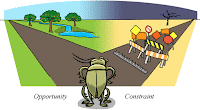
I was asked the other day why I thought some people are more lucky than others. My reply was that I don’t believe in luck as a factor in life. I think we see people as lucky when their hard work meets opportunity. Many “lucky” people leap at opportunities and are prepared to embrace failure.
Embracing failure dose not mean seeking out failure, rather love it, listen to it, make a friend of it, learn from it and treat is as a real insight on how you can grow and develop.
There are a number of reasons to embrace failure;
1. Failure teaches us. Failure narrows down the possible approaches to success. Scientists rely on trial and error in their research. Each failed experiment brings them a little closer to revolutionary breakthroughs. Think of your own efforts as experiments. When you don’t get the desired result, figure out why. Then try again with your new knowledge.
2. Failure reveals our ability. You’ll never know how much weight you can lift until you reach an amount you can’t. I think trainers often refer to this as “lifting to failure.” Pushing yourself as far as you can lets you know what’s possible. By avoiding limits, you’ll never reach your peak. The fear of failure stops us a lot shorter than failure itself. So keep going until nothing more is possible. Then celebrate what you’ve accomplished.
3. Failure makes us stronger. Those same weight lifters who lift to failure also have learned that is the way they build muscle. At first the tissue is damaged, but it’ll heal bigger and stronger than before. Soon the athlete will be able to lift more weight. The same is true for our pursuits. Failure strengthens our character, with each effort, we grow a little stronger.
4. Failure inspires us. When we don’t let discouragement hold us back, failure makes our desire burn hotter. Often this inspiration is a wish to avoid another failure. If failure makes you work harder or focus more, it’s an experience with tremendous value.
5. Failure inspires others. Leaders must take risks. Even when they don’t succeed, their courage can still make a difference.
6. Failure builds courage. Becoming more comfortable with failing enables you to take more risks. If you know you can deal with it, it will no longer threaten you. If you're open to failing, you'll readily take more chances.
7. Failure is better than regret. The times I’ve been denied an opportunity never felt as bad as when I’ve let opportunities pass me by. At least when we fail, we know. Not trying at all leaves us wondering. Avoid kicking yourself later by taking a leap when the opportunity presents it’s self.
8. Failure leaves us open to better opportunities. Without an awareness of the big picture, it’s easy to perceive failure as misfortune.
9. Failure makes success a little sweeter. We appreciate victory more when we’ve tasted defeat. We expend a lot of energy running from failure. Try embracing it. Find the opportunity in the adversity. If there’s a recipe for success, failure might be its primary ingredient.
I’ve heard a lot about SMART goals, how in order for goals to be effective, they need to be SMART. That the gaols are
Specific,
Measurable,
Achievable,
Relevant and
Time-bound. However, I think this can go against our own motivation to take that opportunity. It can steal our potential by making us conform. If we are fearful of failure and want to protect ourselves by setting goals that don’t push us and open us up we won’t reach our full potential.
I’m not suggesting that you should not have goals; rather you should reach for the stars. Successful people know the importance of setting goals, they also have many failures on the way to their success.

I know I’m an opportunist I don’t see the glass half full, I see the full jug beside the glass ready to top it up. If I start each day reflecting on the things that I am grateful for such as a lovely wife and children, my health, a stimulating and challenge career, my glass is filled to the brim. If I let the negative things empty the glass I’ll end up setting smart goals!
How about setting goals that are your vision. Step out of that comfort zone, manage the risk, learn from the failures and create your own competitive advantage. Create your own luck.
 Why do we need anger? We react with anger for a number of different reasons. For example, we get angry when we are trying to protect our rights or maintain our individual identity. To stand up to those who are bent on preying on the weak or against social injustice. It can be a crude way of protecting more vulnerable emotions or to give us the time to retreat, compose ourselves and live to fight another day.
Why do we need anger? We react with anger for a number of different reasons. For example, we get angry when we are trying to protect our rights or maintain our individual identity. To stand up to those who are bent on preying on the weak or against social injustice. It can be a crude way of protecting more vulnerable emotions or to give us the time to retreat, compose ourselves and live to fight another day.
